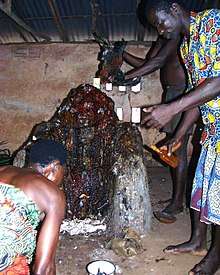Haitian mythology
Haitian Vodou is a syncretic mixture of Roman Catholic rituals developed during the French colonial period, based on traditional African beliefs, with roots in Dahomey, Kongo and Yoruba traditions, and folkloric influence from the indigenous Taino peoples of Haiti. The Loa, or spirits with whom Vodouisants work and practice, are not gods but servants of the Supreme Creator Bondye (pronounced Bon Dieu). In keeping with the French-Catholic influence of the faith, vodousaints are for the most part monotheists, believing that the Loa are great and powerful forces in the world with whom humans interact and vice versa, resulting in a symbiotic relationship intended to bring both humans and the Loa back to Bondye. "Vodou is a religious practice, a faith that points toward an intimate knowledge of God, and offers its practitioners a means to come into communion with the Divine, through an ever evolving paradigm of dance, song and prayers."[1]
History and origins of Voodooism in Haiti
Voodoo originated from the Animist beliefs of the Yoruba tribes in Benin,[2] but it developed in Haiti during the 18th century among the West Africans slaves who were being evangelized under the French Colonial power. Instead of abandoning their animist beliefs altogether, the slaves chose to affiliate their own traditional representations to the closest personal figures in the Roman Catholic faith for more meaningful purposes. The Bondye, or “Bon-Dieu” in French, represents the Supreme monotheist God, the Creator and most importantly, the Unreachable. According to the Animist belief, the only way possible to reach the Bondye and trigger change in society is by imploring a connection or relationship with the Spirits of the late ancestors which are called Loas.

There are in total 180 Loas in the Voodoo religion, each of them carrying a name and, a specific and exclusive function. For instance, "Guede"[3] is the spirit of life and death who is assigned to separate the souls and bodies of people when the time comes and also to watch over their graveyards. Through ceremonies of dance and singing, the Haitian Voodoo practitioners invoke these same spirits that in return will possess their bodies and dictate to the people the solution to their social preoccupations. Myths of the Haitian Independence from the French Colonial forces even suggest that this same Spirit, "Guede" entered the body of one of the slaves and cultivated the roots of the Haitian Revolutionary ideologies. This is one of the reasons why Voodoists consider their faith as a way of escape not only from Slavery but also from their personal issues.
Although this is a positive way of picturing this folkloric religion, most believers of Catholicism reject Voodooism that they say is a "pact with Satan"[4] that is till today the main source of misery, poverty and natural disaster in Haiti.
Related notions
- Asagwe - Haitian Vodou dancing used to honor the Loa.
- Avalou - ("supplication") Haitian Vodou dance.
- Coco macaque - Haitian Vodou implement. It is a stick, which is supposed to be able to walk on its own. The owner of a coco macaque can send it on errands. If it is used to hit an enemy, the enemy will die before the dawn.
- Gangan, Houngan - Haitian priests. They lead the peoples in dancing, drumming, and singing to invoke the Loa.
- Ghede - family of spirits related to death and fertility.
- Guinee - Haitian afterlife. It is also where life began and the home of their spirits.
- Loa - Haitian Vodou spirit.
- Mambo - Haitian priestess who, together with the Houngan, leads the Vodou rituals and invokes the Loa.
- Paquet congo - charms made of organic matter wrapped in cloth, intended to rouse the Loa.
- Petro - aggressive and warlike family of spirits
- Rada - old, benefic family of spirits
- Tonton Macoute, a Haitian mythological phrase meaning "bogey man" (literally: "Uncle Bagman")
- Ville au Camp - ("House in the Fields") the underwater capital of the Loa
See also
- Haitian Vodou
- Culture of Haiti
- Religion in Haiti
- Haitian art
- Veve, a religious symbol commonly used in Vodou and Palo
References
- Vye Zo Komande LaMenfo, Mambo (2011). Serving the Spirits: The Religion of Vodou. United States: Mambo Vye Zo Komande LaMenfo. p. 12. ISBN 978-0615535241.
- Weber, A. S. (December 2018). "Haitian Vodou and Ecotheology". Ecumenical Review. 70 (4): 679–694. doi:10.1111/erev.12393.
- Scalora, Sal (1993/03//Mar/Apr93). "A salute to the spirits". Americas. 45 (2): 26. Check date values in:
|date=(help) - Schmidt, David (2011-02-04). "Making sense of hell on Earth". National Catholic Reporter. 47 (8): 20.